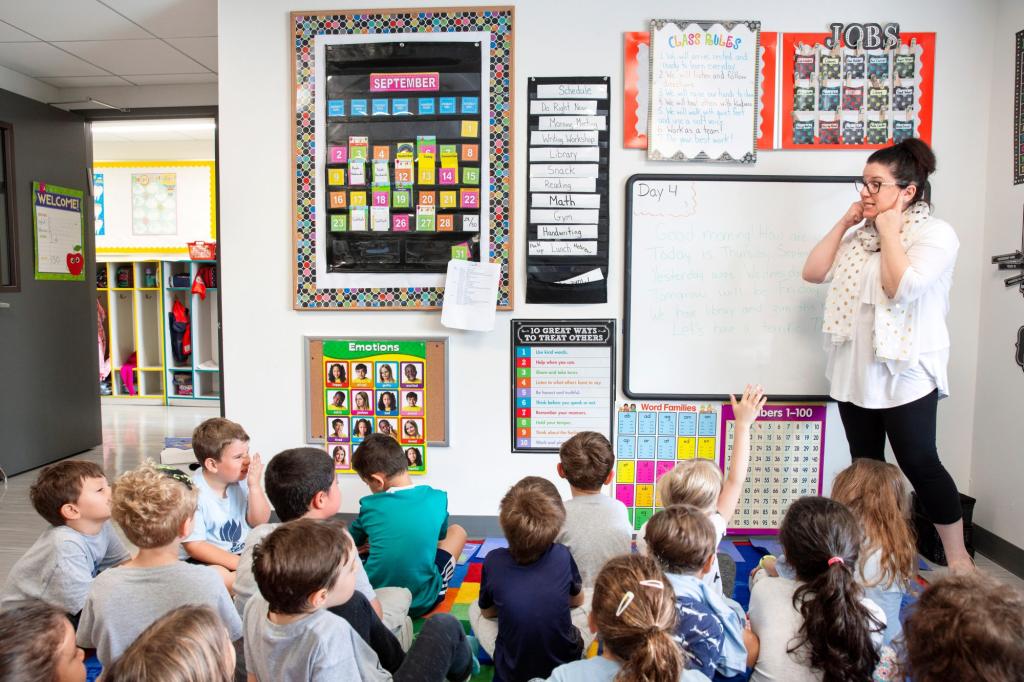Nearly 80% of US teachers say youngsters are not as prepared to start elementary school as in previous years — the most dismal percentage of any country taking part in the global survey.
About half the US teachers surveyed — 47% — blamed the lingering impact of COVID-19 disruptions for the setbacks involving their countries’ youngest pupils.
Teachers were asked in the poll, “From your experience, how do you think school readiness among children has changed in the last few years? Children are more ready for school than they were a few years ago? Children are just as school ready as they were a few years ago? Children are less ready for school than they were a few years ago”
A staggering 78% of US teachers said American students are less ready, only 4% said more ready, and 18% said just as ready or the same.
Most of the American educators noted that a significant proportion of 4- and 5-five-year-olds are unable to wash their hands, go to the toilet independently, identify numbers and letters or read simple words, including their own name.
The perceived lack of preparedness in the US was far worse than that cited by educators in the UK, the Netherlands, Brazil, South Africa and India, according to the poll conducted for the UK-based global children’s charity group Their World, in partnership with Hall & Partners.
By comparison, 60% of teachers in the UK said their youngest stucents were less ready, as did 64% of instructors in Brazil, and 55% in the Netherlands.
India bucked the trend, with 70% of teachers in the world’s most populous country saying students entering their schools were more prepared, as did 45% of South African educators.
Seventy percent of American teachers also said young US students are less ready for school because the kiddies didn’t attend pre-K, which has been universally available in New York City for nearly a decade. But not having pre-K in much of the US has been the case for decades.
About 57% of the teachers also cited poverty as a factor and said parents are not teaching their kids “school ready” skills.
One Bronx parent of a 5-year-old autistic boy entering first grade told The Post on Monday that it’s the responsibility of parents to have their children ready for kindergarten and suggested that society should stop making excuses.
The mom, Ruth Valladares, 43, a nail-salon worker, said her son Tayden is ready for school and knows how to do basic tasks cited in the survey.
“He knows his name and how to write it and how to wash his hands and go to the bathroom alone.” she said.
She said COVID isn’t a good excuse for parents whose children are underperforming.
“Right now everybody says `COVID’ for everything, but it’s not like that,” Valladares said.
She said Tayden attended preschool before he started kindergarten and that she sat down with him to teach him how to write his name.
“You need to help your children at home,” Valladares said.
State Assembly Education Committee Chairman Michael Benedetto (D-Bronx), a retired elementary school special-education teacher, said the more-pre-K and 3-K instruction that is available, the better to assist parents struggling to make ends meet as well as help youngsters.
But he said parental responsibility is an important part of the equation, too.
“Parenting means so much. Home life means so much. Eighty percent of learning comes from the home,” Benedetto said.
Upon releasing the findings Justin van Fleet, president of Theirworld, issued a call to action for more public funding for childcare and earlier schooling such as pre-K. .
“Without urgent investment into children’s early years, the youngest and most vulnerable in the United States will begin their lives at a severe disadvantage,” van Fleet said.
“This could have lasting consequences for generations.”
He emphasized that bolstering early education spending will help better address inequality and labor shortages.
“Ninety percent of a child’s brain is developed by the age of five, making the years between birth and school the most critical in a child’s life. Our leaders must recognize that investing in these early years is one of the most cost-effective ways to build healthier, wealthier, and greener societies,” van Fleet said.
The global survey queried more than 2,600 teachers, including 506 in the US.
